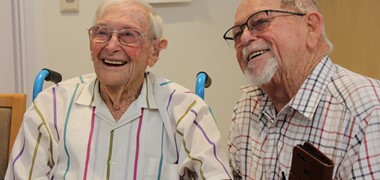What to do when living at home is no longer an option

There are many reasons why people move into residential aged care. For some, it’s the next step after being in hospital with a significant injury or illness. Others reach the stage where living independently brings an increased risk of falls, or where their chronic condition requires greater support than at-home services can provide.
For Maxine and Bob Robinson, the decision to move into residential care was made with the help of their three adult children, after it became clear the couple could no longer manage at home.
We were going along fine, but then I got sick and I couldn’t look after him. The kids could see that, so it was the beginning of looking for somewhere to go,” says Maxine.
Maxine and Bob’s daughter Tracey Gillet says the family began by exploring all the available options.
“We deliberated over all the combinations of in-home care services and residential aged care, the latter having more benefits for them. Mum and Dad were fully engaged in the process and we were happy they were going together,” she said.
So what are some early steps you can take when you realise that you, or a loved one, can’t continue living independently?
Have the conversations.
Involving the whole family in the discussions and decision-making is the best first step for anyone considering residential aged care for themselves or for a loved one.
Michael Bowran is a Client Engagement Coordinator with Brightwater, working with incoming residents and their families to help ensure a smooth and successful transition for everyone.
“It's important to be prepared emotionally for such a life changing decision and to make sure all the important conversations have been had, not just with the person requiring care but also with significant others in the family,” says Michael.
Make sure the finances are up to date.
In addition to preparing emotionally, families can also reduce the stress and uncertainty by ensuring all financial information is up to date with Services Australia as this will affect what percentage of the fees and charges might be covered by government funding. Start by assembling details of all assets and income, then contact My Aged Care for assistance in working out the fees and charges.
“It’s important to do your research into what the costs are and what potentially you could be charged when you're going into aged care depending on your income and assets,” says Michael.
Put important paperwork in place.
Finally, before booking tours with potential homes, it is a good idea to submit the formal application for approval for residential aged care. This involves a free assessment by the Aged Care Assessment Team (ACAT), which can be undertaken before a move is necessary. There is no need for a referral - simply contact My Aged Care on 1800 200 422 to begin the process. Once the assessment has been done, ACAT can provide an approval letter and support plan. After that, Michael says there is just one more thing to address.
“I think it's important that people consider having an Advance Health Directive, an Enduring Power of Attorney, and an Enduring Guardianship,” he says. Discover what those terms mean with our handy guide.
Together, these documents record the individual’s wishes and preferences with regard to their health and finances. This means they can still have a say in what happens even if they become unable to express their views at a later date, and so they have someone who can speak and act on their behalf. More information on each can be found on the Healthy WA website.
Then, the move itself.
Michael says that once the emotional and financial preparation has been done, the paperwork completed, and the new home chosen, it’s time to look forward to everything that the new chapter will bring.
“The staff are very good at helping the family to transition as well, particularly when there are couples and one is left at home and one is coming into care. I tell the person remaining at home, this is about you as well and you need to be part of that transition. Give yourself time to adjust to this big change,” he says.
For Maxine and Bob Robinson, the move has been a success, and they are enjoying all the benefits of living in residential aged care.
“Our day is pretty well as full as we want. We do the exercise groups and go to the entertainment that comes in on a weekly basis. We pretty well fully participate in what's going on,” says Bob.
“It's a beautiful place - Everything's done for you and the carers are wonderful. This is our home now until the end,” says Maxine.
If you would like some assistance or to know more about residential aged care
Give us a call on 1300 223 968 or email [email protected]


